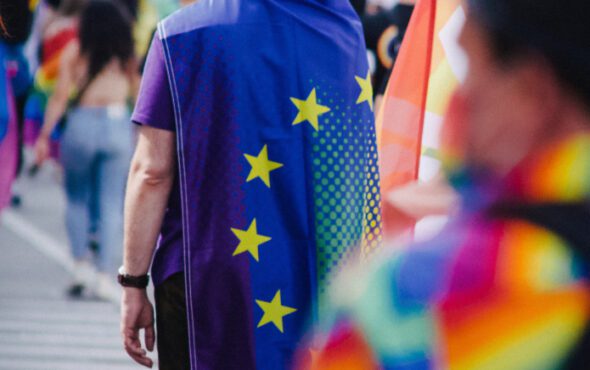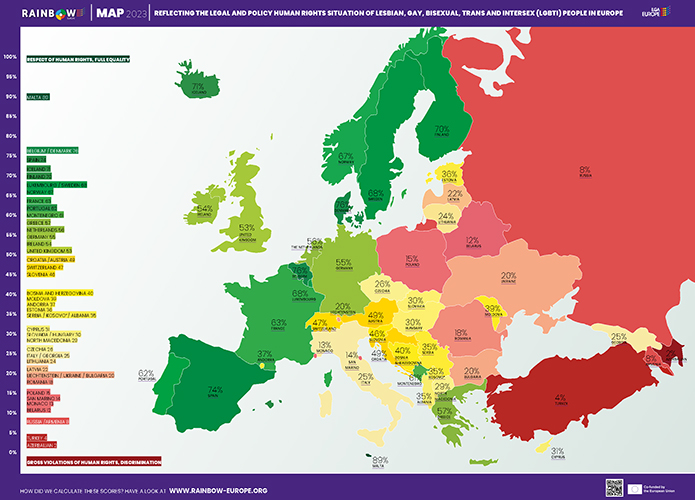
LGBTQ+ advocacy group ILGA-Europe’s annual ‘Rainbow Europe’ index has revealed the best and worst places to be LGBTQ+ in the continent.
Published on 11 May, the report examined the advances made in each country in the 12 months from January to December 2022.
Countries are given a score from zero to 100 per cent, with the lower end reflecting poor human rights and the higher reflecting an equal society.
Malta, where EuroPride is due to take place in September, came out on top for the eighth year in a row with a score of 89 per cent.
Among its successes in 2022 were the Ministry of Health announcing that men who have sex with men (MSM) will be able to donate blood on an equal basis with others and the country’s Gender Wellbeing Clinic being relocated to a bigger and more accessible location.
READ MORE: Europe moves towards self-ID for trans people
Belgium occupies second place with a score of 76 per cent, a rise of four points due to the inclusion of gender identity and sex characteristics as aggravating factors in the country’s penal code.
Denmark placed third, also with a score of 76, with the rise of two points attributed to its new equality action plan, which includes specific measures on sexual orientation and gender identity but falls short of inclusion of projects on sex characteristics.

ILGA-Europe
Rounding out the top five were Spain (74 per cent) and Iceland (71 per cent).
Finland, Luxembourg, Sweden, Norway and France finished in 6th-10th place with scores of 70, 68, 68, 67 and 63, respectively.
UK now ranks 17th after topping the list just eight years ago
After falling from 10th to 14th place in last year’s ‘Rainbow Europe’ index, the UK has this year plummeted an additional three places behind Ireland, Greece and Germany – now ranking at 17th overall.
It was previously named the best place to be LGBTQ+ in Europe in 2015, a position it held for four consecutive years.
READ MORE: LGBTQ+ journalists face high levels of abuse in UK, study finds
Robbie de Santos, Director of Communications and External Affairs at LGBTQ+ charity Stonewall, said: “The UK Government could once lay claim to having world-class laws for LGBTQ+ people – but no more. This year’s report shows that our European neighbours continue to surge ahead while the UK stagnates.
“The next government has the potential to get the UK back on track. Our party leaders must seize the opportunity to unlock the potential of all LGBTQ+ people across the UK. But for now, it’s vital that the UK Government delivers on its promise to ban conversion practices, and removes its block on the Scottish Gender Recognition Reform Bill, to ensure it is at least ending the stagnation.”
⚠️BREAKING⚠️
The UK has fallen three further places in @ILGAEurope's annual ranking of LGBTQ+ rights across Europe.
In 2015, the UK was top of the ILGA rankings – a position it had held for four consecutive years. In 2023 the UK is at number 17, falling from number 14 in 2022.
— Stonewall (@stonewalluk) May 11, 2023
The three countries at the other end of the cale are Azerbaijan (two per cent), Turkey (four per cent), and Armenia (nine per cent) – exactly the same as the last three years.
Among them, only Armenia increased an index point after revoking its ban on blood donations from men who have sex with men.
READ MORE: Majority of anti-trans adults don’t know any trans people, study finds
“As powerfully evidenced in this year’s Rainbow Map, the rise of anti-LGBTI rhetoric from anti-democratic forces, particularly instrumentalising false anti-trans narratives, is being fought back by politicians in Europe who have the courage to make a stand for the fundamental human rights and equality of every citizen,” said Evelyne Paradis, ILGA-Europe’s Executive Director.
“The map highlights the clear fact that progress for LGBTI people is still possible, and more important than ever, with the need for more leaders to push back on attacks on democracy for all by pushing forward.
“We commend those politicians who have taken the stance that needs to be taken for the good of everyone in our society, and we encourage more to step up to the plate as across Europe democracy and human rights are under threat from the far-right.”
The report is available in full here.



